Eoin Morgan: England skipper on the art of captaincy
- Published
England's journey from 2015 World Cup disaster to the 2019 semi-finals has been masterminded by Eoin Morgan.
The England captain is responsible for everything - from shaping the team's ethos and style of play to minute details out on the field of play.
Here, Morgan tells the Test Match Special podcast about the decisions he has to make in the heat of battle, and why he can't let his emotions surface like his India counterpart Virat Kohli.
How much of your captaincy is instinctive?
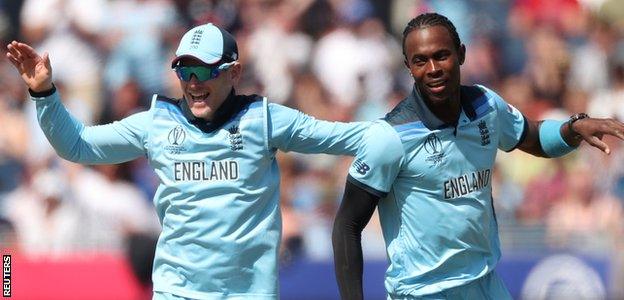
Eoin Morgan, left, has captained England 109 times in one-day cricket
You have to be adaptable. I don't think you can go into a game with any fixed plan.
When you look at your bowling line-up, naturally you will have bowlers you go to in certain situations - so, during the game, it's a matter of identifying the most important situations and giving the responsibility to the player you think will respond the best.
Some captains can go in blindly, particularly in club cricket.
I watch a lot of club cricket - my friends play at a local club - and the game is always on the line there, particularly in a run chase.
Chasing 150, a team can be 100-0 and then be bowled out for 127.
As a captain, you sit on the sidelines and it's evident the best place to bat is up front.
It used to be looked down upon as the toughest time to get through when the ball moves around and jags off the seam, but now the wickets are so good and the best place to bat is in the top three or four.
You don't necessarily have to go hell for leather with your best bowler bowling seven or eight overs with the brand new ball up front, when potentially he might get whacked everywhere and more pace on the ball might suit the top of the order.
Being adventurous and open to something different is something I'd encourage captains to do.
How far ahead do you plan?
There is a lot of planning that goes into any particular game - analysis, field settings etc - but primarily you want to stick to 'plan A' for as long as you can. That's traditionally the top of off stump, using your bouncer, maybe a variation of a slower ball in there - but as simple as that for as long as you can.
If you do it well enough, it's good enough for most batsmen around the world.
How do you keep on top of who has bowled how many overs?
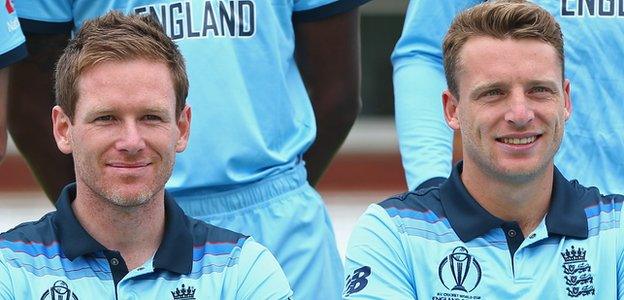
The England one-day thinktank: captain Eoin Morgan and his vice-captain Jos Buttler
Compartmentalising things helps, so if both opening bowlers have bowled five overs, you earmark them for another part of the game when they come off bowling.
That might change but it gives you a mental picture.
In the back of your head, you want to register how they have bowled and what has come out of their first spell.
They might have only bowled a couple of overs and then have to come back a little bit later. Therefore, when you take a wicket, get them back into the game to make them feel like the first spell hasn't really happened and the second spell can be a lot better.
I tend to use the scoreboard a huge amount. I do it when I'm batting as well, just to see where the game is going, where it could potentially go, the most important part of the game, trying to identify it and then getting our best bowlers in line for that.
I speak to our wicketkeeper, Jos Buttler, too.
He's our vice-captain and an unbelievable leader, but I think one of his best attributes is that he reads the game incredibly well and gives me unbelievable advice.
He's not disheartened if I don't take it and that's awesome - but the majority of the time we are both on the same page.
Has there been a game when you have got your maths wrong?
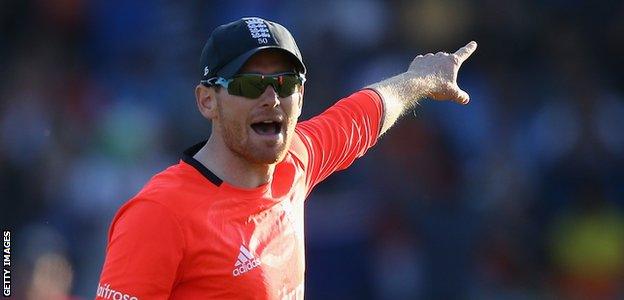
Eoin Morgan played one-day cricket for Ireland before switching to England
I can't remember it happening in an international game but I have definitely done it in county games, particularly in Twenty20 because the scoreboard isn't always up.
Often it's an advertisement for the next game, or a replay of the previous ball, or panning to somebody in the crowd who is downing a beer.
It's not the easiest to keep an eye on and I have definitely stumbled in county cricket before.
Does any advice come onto the field from coaches?
There is an open line of communication between the dressing room and me out on the field when we're fielding, and that's important because one of the things you sometimes get as a captain, particularly early in your captaincy career, is tunnel vision.
Different ideas might open your eyes to something else.
How much notice do you give a bowler before they have to bowl?
About an over - unless there is a drastic change or you feel there is a really important over coming up.
If the batsman hits the last three balls of the current over for six and there is a momentum swing, you might feel the need to get one of your better bowlers on straight away, or one of the bowlers more suited to getting that guy out.
How do you keep calm in pressure situations?
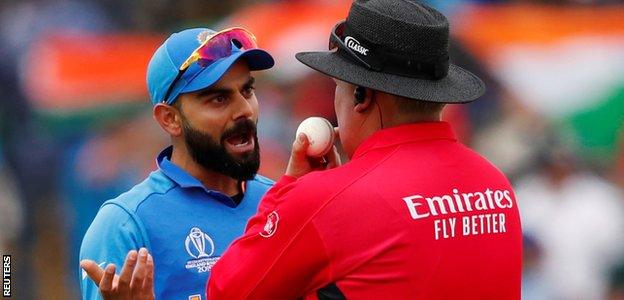
India captain Virat Kohli is far more animated on the field than Eoin Morgan
I have practised it for years. Me trying to be like Virat is the worst case scenario.
If you see me effing and blinding, throwing my cap on the ground and kicking it, we are in a really bad place as a side.
I tend to stay quite level. I make better decisions when I am level and I also take in good information when I am level, so it's important for me to stay in that head space.
How much do you talk to a bowler before the last over?
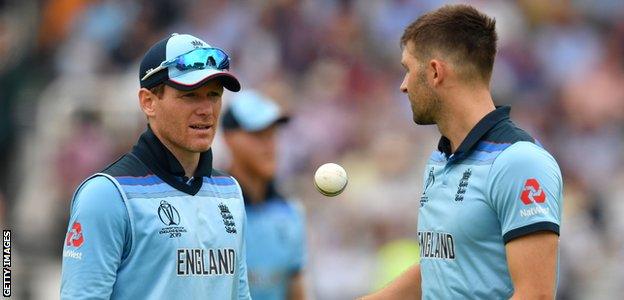
Eoin Morgan prefers an open line of communication with his bowlers, rather than speaking to them only when they have been hit for four
When a guy gets hit for two fours in a row you'll see a captain marching over to the bowler's mark and start a conversation. I don't do that.
I try to go to the bowler as often as I can anyway so there is an open line of communication and it's not disappointment every time a captain comes up and talks about what he is trying to do.
Guys make mistakes all the time and sometimes they don't want to talk about it.
I think it's important to talk about it so you can actually get past it and think about the next ball, but as regards the last over of a game, I think it's important to talk about how the over is going to unfold.
You've already had 49 overs - or in T20, 19 overs - so you have a good indication of what works on that particular pitch.
You'll know the guy you are playing inside out and what's effective for him, so you devise a plan and stick to it.
Do you like to influence the game with your captaincy?
No. The quieter the game the better for me.
As a captain, you don't want to be at the forefront of anything that goes on. The collective team performance is the ultimate goal as a captain.